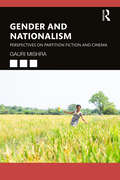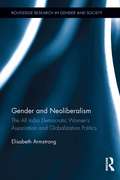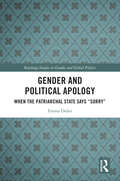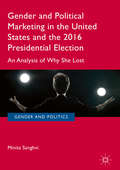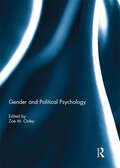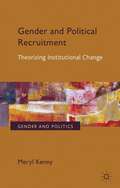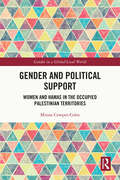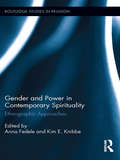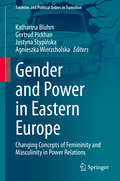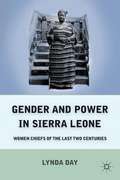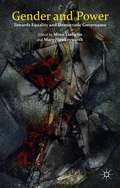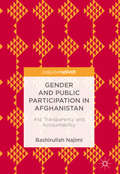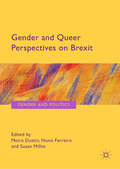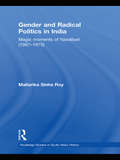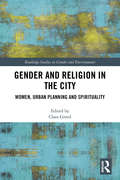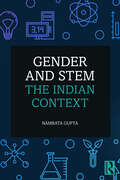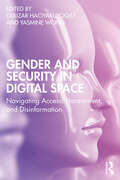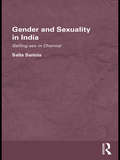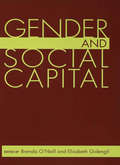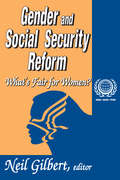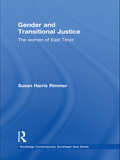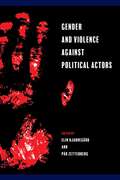- Table View
- List View
Gender and Nationalism: Perspectives on Partition Fiction and Cinema
by Gauri MishraThis book studies negotiations of gender politics in the process of nation formation in the aftermath of the Partition. One of the most traumatic events in South Asian history, the Partition forms the basis of numerous literary and cinematic interpretations. Drawing on Hindi, English, Urdu and Punjabi fiction, it shows how gender is irrevocably woven into the idea of the nation and the politics of it. It focuses on the works of Saadat Hasan Manto, Rajinder Singh Bedi, Ismat Chughtai, Yashpal, Khushwant Singh, Abdullah Hussein, Mumtaz Shah Nawaz and Attia Hosain to delve into the horrors of the Partition, toward women in particular, and their representations in literary and cinematic imaginations. As an important contribution to the study of the Partition of India, this volume will be of great interest to scholars and researchers of literature, culture studies, film studies, politics, gender studies and South Asian studies. .
Gender and Neoliberalism: The All India Democratic Women’s Association and Globalization Politics (Routledge Research in Gender and Society)
by Elisabeth ArmstrongThis book describes the changing landscape of women’s politics for equality and liberation during the rise of neoliberalism in India. Between 1991 and 2006, the doctrine of liberalization guided Indian politics and economic policy. These neoliberal measures vastly reduced poverty alleviation schemes, price supports for poor farmers, and opened India’s economy to the unpredictability of global financial fluctuations. During this same period, the All India Democratic Women’s Association, which directly opposed the ascendance of neoliberal economics and policies, as well as the simultaneous rise of violent casteism and anti-Muslim communalism, grew from roughly three million members to over ten million. Beginning in the late 1980s, AIDWA turned its attention to women’s lives in rural India. Using a method that began with activist research, the organization developed a sectoral analysis of groups of women who were hardest hit in the new neoliberal order, including Muslim women, and Dalit (oppressed caste) women. AIDWA developed what leaders called inter-sectoral organizing, that centered the demands of the most vulnerable women into the heart of its campaigns and its ideology for social change. Through long-term ethnographic research, predominantly in the northern state of Haryana and the southern state of Tamil Nadu, this book shows how a socialist women’s organization built its oppositional strength by organizing the women most marginalized by neoliberal policies and economics.
Gender and Political Apology: When the Patriarchal State Says “Sorry” (Routledge Studies in Gender and Global Politics)
by Emma DolanThis book provides a much-needed gendered reading to the increasingly important practice of political apology.Engaging in depth with two cases of interstate apologies for conflict-related sexual violence – Japan’s apologies for the South Korean "comfort women" and US apologies for the Abu Ghraib scandal – the author argues that political apologies are particularly "excitable" or uncontrollable forms of speech which are composed of and rearticulate historically constituted gender norms. In doing so, political apologies work to recognise and make visible particular gendered victims whilst simultaneously obscuring others. Through the concept of "legitimate victimhood", the author examines the performative ways in which political apologies (re)negotiate and (re)make embodied gendered identities. Ultimately, she argues that the ambivalent form of recognition offered by the performance of official apologies in these cases resulted in numerous unintended consequences, including opportunities for victims to demonstrate linguistic agencies. Political apologies for conflict-related sexual violence can therefore — indirectly — empower the gendered victims addressed.This book will be of great interest to students, academics, and researchers in the fields of politics and international relations, women’s and gender studies, memory studies, victimology, transitional justice, human rights, and peace and conflict studies. It will also interest policymakers, practitioners, and campaign groups involved in such areas as justice for gender-based violence.
Gender and Political Marketing in the United States and the 2016 Presidential Election
by Minita SanghviThis book focuses on the unique challenges women in politics face in the United States based on their gender. It also focuses on issues of intersectionality in political marketing, including race, age, weight, sexual orientation, gender identity and gender expression. From a theoretical perspective, this book facilitates an investigation of the interplay of gender dynamics and power structures within political marketing. Focusing on women in the United States of both parties at various levels in politics, it examines both historical data and contemporary examples of female politicians and their campaigns. Using qualitative research methods and taking a feminist approach to data collection and analysis, this book features primary source interviews with 15 politicians, including a Governor, Senator, two Congresswomen, and several state and local legislators. It also incorporates interviews with 19 political consultants, PAC executives, aides, political party officials, and members of the media.
Gender and Political Psychology
by Zoe M. OxleyThis book showcases new work done by gender politics scholars and political psychologists, covering a variety of political psychology topics. These include stereotyping and prejudice, intergroup conflict, social identity, attitude formation, group affinity, group decision-making, anxiety, contextual effects on individual behaviour, and the evolutionary roots of political behaviour. Political psychological insights are applied to address topics of longstanding concern within the field of gender and politics. Among the citizenry, gender differences in political ideology, responses to partisan conflict, Hispanic identity formation, and symbolic racism are explored. Other chapters pose the following questions relating to female candidates: What have been the effects of state parties’ gender-inclusive policies? Who is most likely to gender stereotype candidates? Are general attitudes toward women in political office related to vote choice in specific contests? What are the implications of politicized motherhood? Finally, a set of essays engage a variety of themes related to gender, decision-making rules, and authority in small deliberative bodies. This book was originally published as a special issue of Politics, Groups, and Identities.
Gender and Political Recruitment
by Meryl KennyThis book explores the gendered dynamics of institutional innovation, continuity and change in candidate selection and recruitment. Drawing on the insights of feminist institutionalism, it extends the 'supply and demand model' of political recruitment via a micro-level case study of the candidate selection process in post-devolution Scotland.
Gender and Political Support: Women and Hamas in the Occupied Palestinian Territories (Gender in a Global/Local World)
by Minna Cowper-ColesThis book finds and explores a gender gap in political support in the Occupied Palestinian Territories whereby more women than men support Hamas, and more men than women support Fatah. The author then shows how economic interests and religion largely explain this gender gap, and explores how the Israeli occupation, the Israel-Palestine conflict, women’s rights, nationalism, and political repression impact Palestinian political support. She demonstrates how religion interacts with nationalist discourses, which in turn reinforce differential gender roles in Palestine. She also shows how patronage impacts political support in a gendered way, with Fatah’s ability to provide employment opportunities being strongly linked to their support base amongst men. The book concludes with an analysis of similar trends in the wider Middle East, with women across the region tending to prefer religious parties, compared with men. While making an important contribution to studies of Palestinian politics, this book also has implications for much broader issues, such as explorations of gender and political support beyond the Western context and understanding widespread female support for Islamist parties in the Middle East. It highlights the importance of situating explorations of political support within their wider context so as to understand how particularities of ideologies, economies and social structures might interact in a specific political system. This book will be of great interest to students and scholars of gender studies, Middle East studies, and comparative politics. It will also appeal to those with a broader interest in Middle East politics and development.
Gender and Political Violence: Women Changing The Politics Of Terrorism
by Candice D. Ortbals Lori M. Poloni-StaudingerThis book examines the role of gender in political conflicts worldwide, specifically the intersection between gender and terrorism. Political violence has historically been viewed as a male domain with men considered the perpetrators of violence and power, and women as victims without power. Whereas men and masculinity are associated with war and aggression, women and femininity conjure up socially constructed images of passivity and peace. This distinction of men as aggressors and women as passive victims denies women their voice and agency. This book investigates how women cope with and influence violent politics, and is both a descriptive and analytical attempt to describe in what ways women are present or absent in political contexts involving political violence, and how they deal with gender assumptions, express gender identities, and frame their actions regarding political violence encountered in their lives. The book looks to reach beyond the notion of women as victims of terrorism or genocide without agency, and to recognize the gendered nature of political conflicts and how women respond to violence. This book will be of interest to advanced undergraduate and graduate students in political science, sociology, cultural studies, and gender studies, academics in terrorism studies and gender studies, government officials, NGOs, and professionals working in areas of violent conflict.
Gender and Politics in Post-Reformasi Indonesia: Women Leaders within Local Oligarchy Networks
by Kurniawati Hastuti DewiThis book employs a gendered perspective to uncover an in-depth understanding of the political role of women leaders in local government in Indonesia. Beginning with the story of two women who successfully won the local elections in Indramayu in 2010 and Tangerang Selatan in 2011, respectively, the book uses their experiences as a point of departure to present a discussion on female political leaders’ part within the larger political dynastic structure in Indonesia. The book explores the multiple challenges and difficulties that these women encountered in reaching power and in promoting local democracy, highlighting the patriarchal nature of the oligarchy. In doing so, this book provides a rich empirical account of the current features of female political leaders and their political and familial, linkages. The research, thus, contributes significantly to the work of scholars and political activists seeking to unpack the process and progress of democratization in post-reformasi Indonesia, in which women’s political participation and leadership are an inevitable and vital part. In doing so, the book champions how Indonesian women are playing an increasingly important role in the democratic process, even in the face of the enduring challenges posed by familial ties and political dynasty factors that continue to hinder democratization—trends that are also prevalent across multiple Southeast Asian countries in the twenty-first century. Relevant to scholars and students situated at the intersection of gender and politics, this translated and updated co-publication is a tour de force, led by one of Indonesia’s seminal scholars in women’s studies.
Gender and Power in Contemporary Spirituality: Ethnographic Approaches (Routledge Studies in Religion #26)
by Anna Fedele Kim E. KnibbeThis book explores the entanglements of gender and power in spiritual practices and analyzes strategies used by spiritual practitioners to attain what to social scientists might seem an impossible goal: creating spiritual communities without creating gendered hierarchies. What strategies do people within these networks use to attain gender equality and gendered empowerment? How do they try to protect and develop individual freedom? How do gender and power nevertheless play a role? The chapters in this book together and separately demonstrate that, in order to understand contemporary spirituality, the analytical lenses of gender and power are essential. Furthermore, they show that it is not possible to make a clear distinction between established religions and contemporary spirituality: the two sometimes overlap, and at other times spirituality distances itself from religion while reproducing some of its underlying interpretative frameworks. This book does not take the discourses of spiritual practitioners for granted, yet recognizes the reflexivity of spiritual practitioners and the reciprocal relationship between spirituality and disciplines such as anthropology. The ethnographic descriptions of lived spirituality included in this volume span a wide range of countries, from Portugal, Italy, and the Netherlands to Mexico and Israel.
Gender and Power in Eastern Europe: Changing Concepts of Femininity and Masculinity in Power Relations (Societies and Political Orders in Transition)
by Katharina Bluhm Gertrud Pickhan Justyna Stypińska Agnieszka WierzcholskaThis book explores the contradictory development of gender roles in Central and Eastern Europe including Russia. In light of the social changes that followed the collapse of communism and the rise of new conservatism in Eastern Europe, it studies new forms of gender relationships and reassesses the status quo of female empowerment. Moreover, leading scholars in gender studies discuss how right-wing populism and conservative movements have affected sociopolitical discourses and concepts related to gender roles, rights, and attitudes, and how Western feminism in the 1990s may have contributed to this conservative turn. Mainly focusing on power constellations and gender, the book is divided into four parts: the first explores the history of and recent trends in feminist movements in Eastern Europe, while the second highlights the dynamics and conflicts that gained momentum after neoconservative parties gained political power in post-socialist countries. In turn, the third part discusses new empowerment strategies and changes in gender relationships. The final part illustrates the identities, roles, and concepts of masculinity created in the sociocultural and political context of Eastern Europe.
Gender and Power in Sierra Leone
by Lynda DayThis book addresses the gendered political authority in Sierra Leone, a relatively unknown topic, and looks at the part it plays in women's history, political history, political transformation in Africa, and global women's political leadership.
Gender and Power: Towards Equality And Democratic Governance (G - Reference, Information And Interdisciplinary Subjects Ser.)
by Mary Hawkesworth Mino VianelloDespite explicit commitments to gender equality, women experience complex modes of disadvantage and discrimination in all nations of the world. Offering sophisticated insights into the persistence of gendered differences in opportunities, roles, power, and rights in societies across the globe, this volume investigates factors that both enable and constrain women's advancement. From intimate relations within families, to social norms, relations, ideologies, and structures of power, to political institutions, electoral systems, and public policies, the chapters analyze possibilities for and obstacles to inclusive democratic practices and identify interventions essential to enable democratic values to take root. Contributors from Africa, Asia, Europe, Latin America, and the USA provide detailed assessments of the social, economic, and political condition of women, their mobilizations to produce transform gendered power and authority in diverse nations, and their efforts to enhance the quality of their lives, their communities, and democratic governance.
Gender and Public Participation in Afghanistan: Aid, Transparency and Accountability
by Bashirullah NajimiThis book discusses the role of gender and participation within the context of budgeting and planning. Gender and participation are two very closely interconnected issues in these processes, and the author explores how these could better promote accountability and transparency. Through chapters on topics such as access to information and mechanisms for public engagement, gender responsive budgeting, and the role of women in combating corruption, the book includes examples of good practices in gender and participation from the international perspective and to what extent they could be applied in Afghanistan. Working in aid-dependent developing countries with a high level of gender inequality and corruption requires additional knowledge of issues in gender, public participation, accountability, and transparency—regardless of whether working in the public sector or in a non-governmental organization (NGO).
Gender and Queer Perspectives on Brexit (Gender and Politics)
by Nuno Ferreira Moira Dustin Susan MillnsThis collection examines the opportunities and challenges, rights and wrongs, and prospects and risks of Brexit from the perspectives of gender and sexuality. While much has been written about Brexit from legal, political, social and economic perspectives, there has been little analysis of the effects of Brexit on women and gender/sexual minorities who have historically been marginalised and whose voices have been less audible in political debates – both nationally and at the European level. The collection explores how Brexit might change the equality, human rights and social justice landscape, but from the viewpoint of women and gender/sexual minorities. The contributions gathered in it demonstrate the variety of ways that Brexit will make a difference to the lives of women and individuals marginalised because of gender or sexual identity.
Gender and Radical Politics in India: Magic Moments of Naxalbari (1967-1975) (Routledge Studies in South Asian History)
by Mallarika Sinha RoyThe Naxalbari movement marks a significant moment in the postcolonial history of India. Beginning as an armed peasant uprising in 1967 under the leadership of radical communists, the movement was inspired by the Marxist-Leninist theory of revolution and involved a significant section of the contemporary youth from diverse social strata with a vision of people’s revolution. It inspired similar radical movements in other South Asian countries such as Nepal. Arguing that the history and memory of the Naxalbari movement is fraught with varied gendered experiences of political motivation, revolutionary activism, and violence, this book analyses the participation of women in the movement and their experiences. Based on extensive ethnographic and archival research, the author argues that women’s emancipation was an integral part of their vision of revolution, and many of them identified the days of their activism as magic moments, as a period of enchanted sense of emancipation. The book places the movement into the postcolonial history of South Asia. It makes a significant contribution to the understanding of radical communist politics in South Asia, particularly in relation to issues concerning the role of women in radical politics.
Gender and Religion in the City: Women, Urban Planning and Spirituality (Routledge Studies in Gender and Environments)
by Clara GreedThis book provides a conceptual, historical and contemporary context to the relationships between gender, religion and cities. It draws together these three components to provide an innovative view of how religion and gender interact and affect urban form and city planning. While there have been many books that deal with religion and cities; gender and cities; and gender and religion, this book is unique in bringing these three subjects together. This trio of inter-relationships is first explored within Western Christianity: in Roman Catholicism, Protestantism, Eastern Orthodoxy and in the Pentecostal and Charismatic movements. A wider perspective is then provided in chapters on the ways in which Islam shapes urban development and influences the position of Muslim women in urban space. While official religions have declined in the West there is still a desire for new forms of spirituality, and this is discussed in chapters on municipal spirituality and on the rise of paganism and the links to both environmentalism and feminism. Finally, ways of taking into account both gender and religion within the statutory urban planning system are presented. This book will be of great interest to those researching environment and gender, urban planning and sustainability, human geography and religion.
Gender and Rights (Key Concepts in Indigenous Studies)
by G. N. Devy Geoffrey V. DavisPart of the series Key Concepts in Indigenous Studies, this book focuses on the concepts that recur in any discussion of nature, culture and society among the indigenous. This book, the second in a five-volume series, deals with the two key concepts of gender and rights of indigenous peoples from all continents of the world. With contributions from renowned scholars, activists and experts across the globe, it looks at issues of indigenous human rights, gender justice, repression, resistance, resurgence and government policies in Canada, Latin America, North America, Australia, India, Brazil, Southeast Asia and Africa. Bringing together academic insights and experiences from the ground, this unique book with its wide coverage will serve as a comprehensive guide for students, teachers and scholars of indigenous studies. It will be essential reading for those in gender studies, human rights and law, social and cultural anthropology, tribal studies, sociology and social exclusion studies, religion and theology, cultural studies, literary and postcolonial studies, Third World and Global South studies, as well as activists working with Indigenous communities.
Gender and STEM: The Indian Context
by Namrata GuptaThis book studies the prevalence of gender inequalities in the domains of science, technology, engineering, and mathematics (STEM) in India. It explores the paradox of an increasing number of women pursuing higher education in STEM fields while a relatively low percentage enter the job market. The book analyzes the factors that contribute to the loss of potential contributions from women in science. It underscores the need to understand the construction of masculinity and femininity, as well as male privilege and female disadvantage and how these concepts are associated with STEM.Lucid, topical, and rich in empirical data, this book will be indispensable for scholars and researchers of women’s studies, gender studies, sociology of science, science and technology studies, political studies and public policy. It will also be useful to policymakers, organizations, and professionals working in the STEM fields.
Gender and Security in Digital Space: Navigating Access, Harassment, and Disinformation
by Gulizar Haciyakupoglu Yasmine WongDigital space offers new avenues, opportunities, and platforms in the fight for gender equality, and for the social, economic, and political participation of women and marginalised communities. However, the very same space plays host to gender inequalities and security threats with gendered implications. This edited volume ventures into complexities at the intersection of gender, security, and digital space, with a particular focus on the persistent problems of access, harassment, and disinformation. Scholars and practitioners in this volume tackle various facets of the issue, presenting an array of research, experiences, and case studies that span the globe. This knowledge lends itself to potential policy considerations in tackling inequalities and threats with gendered implications in cyber space towards digital spaces that are safe and equal. This book is a must-read for students, scholars, and practitioners seeking to expand their knowledge on the gendered threats in digital space and potential remedies against them.
Gender and Sexuality in India: Selling Sex in Chennai (Routledge/Edinburgh South Asian Studies Series)
by Salla SariolaIndia has one of the highest numbers of HIV carriers in the world. HIV has remained associated with sex work, and large sums of money provided to fund public health interventions have come from global institutions such as UNAIDS, the World Bank and USAID. In the midst of these processes, however, sex workers and their everyday lives have been hidden behind the rhetorics of control and prevention. This book offers a detailed analysis of the experiences of sex workers in Chennai. Based on ethnographic fieldwork, it draws out themes of agency; notions of gender and sexuality; and the HIV prevention industry. While the women’s experiences are closely knit into the medical discourse regarding sex workers, sex work emerges as a complicated knot of poverty, desire, women’s oppression, love, co-option, and motherhood. The author examines how the sex workers actively negotiate the risks of their industry and suggests alternative discourses on women’s sexuality, sexual behaviour and desire, arguing that unless the power imbalances affecting women are addressed, such policies and activities will have little impact. She brings attention to the problems of current policies, discourses and attitudes regarding HIV, sexuality and sex work, and shows how new policies could help to reduce vulnerabilities not only for sex workers, but perhaps for all women in India.
Gender and Social Capital (Gender Politics--Global Issues)
by Elisabeth Gidengil Brenda O'NeillThe volume brings together a stellar group of contributors who examine the social capital thesis by means of four different approaches: theoretical, historical, comparative, and empirical. In the end, this book will serve to answer two fundamental questions which have hitherto been neglected: What can a gendered analysis tell us about social capital? And what can social capital tell us about women and politics?
Gender and Social Security Reform: What's Fair for Women? (International Social Security Ser.)
by Neil GilbertAging populations are creating tremendous pressures on social security systems throughout the world, lifting the need for reform to the top of policy agendas. Proposed reforms often have different implications for men and women. At the same time, traditional family and gender roles are changing with the decline in fertility rates and the rapid rise in women's participation in the paid labor force.While trying to adapt social security systems to the fiscal demands of aging societies, policymakers face the compelling challenge of how to design pension reforms that achieve fair outcomes for women. Gender and Social Security Reform examines how different countries are attempting to meet this challenge. Drawing on comparative studies of European and Latin American countries along with a series of case studies of individual countries, the book provides insights into the gender dimensions of alternative designs for reform. All of the countries studied have recently reformed or are about to reform their pension systems, with a clear trend towards tightening the link between contributions and benefits in order to secure the long-term sustainability of pensions. The book also alerts policymakers to other issues: Should pension systems be gender-neutral or compensate for inequalities in paid and unpaid labor? Does compensation preserve gender discrimination? Are unisex life tables a reliable or fair redistributive tool for women? Or should annuities be linked directly to life expectancy, differentiated by sex and potentially other factors? Does a minimum pension guarantee risk compromising the principle of individual responsibility and work? How can recognition for caring work be balanced with work incentives? What can be done to help social security systems preserve freedom of choice in terms of work-family balance for women, men or the modem family unit as a whole?In analyzing the gender implications of recent social security policies and practices
Gender and Transitional Justice: The Women of East Timor (Routledge Contemporary Southeast Asia Series)
by Susan Harris RimmerGender and Transitional Justice provides the first comprehensive feminist analysis of the role of international law in formal transitional justice mechanisms. Using East Timor as a case study, it offers reflections on transitional justice administered by a UN transitional administration. Often presented as a UN success story, the author demonstrates that, in spite of women and children’s rights programmes of the UN and other donors, justice for women has deteriorated in post-conflict Timor, and violence has remained a constant in their lives. This book provides a gendered analysis of transitional justice as a discipline. It is also one of the first studies to offer a comprehensive case study of how women engaged in the whole range of transitional mechanisms in a post-conflict state, i.e. domestic trials, internationalised trials and truth commissions. The book reveals the political dynamics in a post-conflict setting around gender and questions of justice, and reframes of the meanings of success and failure of international interventions in the light of them.
Gender and Violence against Political Actors
by Elin Bjarnegård and Pär ZetterbergThere has been an increase in testimonies from women politicians who have been targets of violence and from survivors of conflict-related sexual violence. The editors and contributors to of Gender and Violence against Political Actors seek to understand how gender influences both physical and psychological forms of violence and how sexual violence affects both men and women. Chapters focus on theoretical approaches demonstrating how different disciplinary starting points—e.g., politics, violence and gender—give rise to different lenses. Essays examine violence carried out during conflict and peacetime, and relate to the continuum of violence—physical, sexual, psychological, and online. In addition, six country case studies reveal how different types of political actors have been targets of violence. Gender and Violence against Political Actors ends by providing various approaches to responding to the problem of gendered violence in politics while also evaluating policy responses. Contributors: Kerryn Baker, Julie Ballington, Gabrielle Bardall, Gabriella Borovsky, Cheryl N. Collier, Sofia Collignon, Maria Eriksson Baaz, Eleonora Esposito, Nicole Haley, Rebekah Herrick, Sandra Håkansson, Roudabeh Kishi, Anne-Kathrin Kreft, Mona Lena Krook, Rebecca Kuperberg, Robert U. Nagel, Louise Olsson, Jennifer M. Piscopo, Tracey Raney, Juliana Restrepo Sanín, Paige Schneider, Maria Stern, Sue Thomas, and the editors
